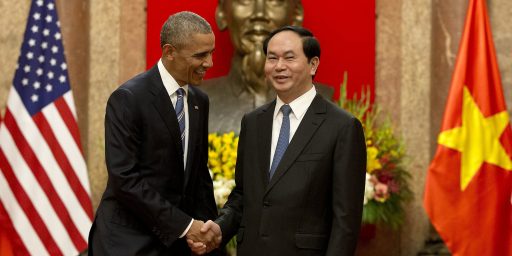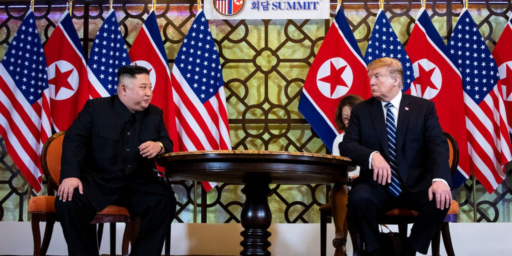KERRY AND VIETNAM
WaPo has an interesting feature entitled, “Vietnam War, Peace Pivotal in Kerry’s Life.” It’s actually quite interesting–to the extent a piece about a presidential candidate who is almost certainly going to lose can be. It’s a rather flattering portrait of a man who has clearly been a more effective Senator than he has a presidential aspirant.
In November 2000, the twilight of his presidency, Bill Clinton traveled to Vietnam, a place that he and thousands of other young Americans tried to avoid in the 1960s. He spoke at the Vietnam National University of Hanoi, and among those in the audience that he singled out for recognition was a tall man from New England who had been to Vietnam many times before.
His name was John F. Kerry, and he had played a key role in bringing about the first visit to Vietnam by an American president since Richard M. Nixon briefly met with U.S. troops there in 1969.
The Vietnam War was the defining event in Kerry’s life, as it was for so many others of his generation. Today, as the Massachusetts senator seeks the Democratic presidential nomination, the war provides a critical underpinning for his candidacy. Kerry, a decorated combat veteran, would not easily be portrayed by President Bush and the Republicans as soft on national security issues.
But Kerry’s time as a combatant, and his equally well-known role as a leader of the veterans who returned from Vietnam and opposed the war, account for only part of his personal odyssey involving the war and its aftermath that symbolically culminated in Clinton’s visit to Hanoi. More than any other member of Congress, it was Kerry, with his ally Sen. John McCain (R-Ariz.), who cleared the way for normal diplomatic relations between the United States and Vietnam, beginning the process of healing the deep wounds of war.
They did so largely out of the limelight, in the tedious and grinding work of a special Senate committee that was appointed to investigate the fates of Americans still missing from the war and the rumors that some of them were alive and being held captive in Southeast Asia. When the committee completed its work, Kerry, the chairman, had produced a unanimous, 585-page report that declared: “There is, at this time, no compelling evidence that proves that any American remains alive in captivity in Southeast Asia.”
McCain was the lightning rod for critics of the committee’s more than yearlong search for the truth, but it was Kerry who held the enterprise together. A lawyer by training, he used his skills to mediate vast differences of opinion on an emotional topic within the committee and with many of those who appeared before it. According to those who watched the process, he was invariably calm, evenhanded and, above all, persistent.
***
Kerry was only one of many who eased the country down the long road to reconciliation with a once-bitter enemy, but other participants in the process describe his role as “pivotal” and that of “the catalyst.”
“John, on behalf of this nation, brought us back to Vietnam with our heads held high,” said former senator Bob Kerrey (D-Neb.), who lost part of a leg and was awarded the Medal of Honor as a Navy Seal in Vietnam. “I think only John could have done it.”



